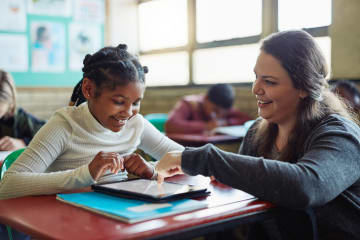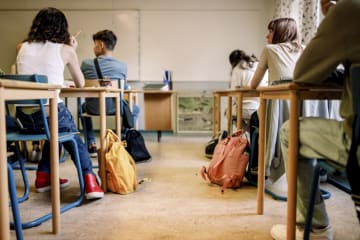Go Beyond the Classroom
By MJ Tykoski
Alumna, College of Education

You’ve passed your teacher’s tests. The certificate is in the mail. The interview is over and the new job is secured. You are a freshly minted teacher. Congrats! You’re DONE!
Or are you?
Many teachers are familiar with the concept of, “continuing education,” which in teacher-speak is also known as “staff development,” “in-service meetings” and/or “professional workshops.” These sessions are designed to keep teachers up-to-date with things, such as the latest trends in classroom management, reaching different student populations or improving standardized testing scores (just to name a few). Most states require some hours of continuing education to renew a teaching certificate and due to these mandates teachers often say that they are never done learning.
However, a teacher shouldn’t just learn new methods and pedagogy. Teachers should also learn new content. While elementary classes are often self-contained, those teachers usually have a preference towards language arts or math. Secondary teachers have a content specialty area such as social-studies or science. Regardless of whether a teacher is self-contained or specialized, it is important to keep up with recent discoveries and thoughts in one or more subjects. Unfortunately, most staff development does not address these content areas. Sure, there may be presentations to learn a new reading strategy that can be used across subjects, but rarely do school districts offer workshops on specific content such as discoveries in the search for extrasolar planets, the latest findings from an archeological dig at Jamestown or new ways to use mathematics to create models. It is just as important for teachers to continue learning their content as it is to understand the latest fad in questioning strategies.
A true educator should want to do more than just get students to pass a standardized test. Students should be instilled with a desire to be life-long learners. In my own science classroom, I try to ignite that desire by showing students that I walk the walk. It takes time and effort, but it is worth it. I’ve joined education outreach groups tied to university research projects, attended scientific conferences and stayed tuned in to the scientific news and reports through organizations like museums and science centers. After these engagements, I come back to the classroom and spend a few minutes sharing what I’ve learned. This approach applies to any content area, such as language arts teachers attending presentations from new and upcoming authors or social studies teachers listening to pundits debate current events.
Stirring the gray matter in content areas is one of the best ways for a teacher to demonstrate continued learning and desire to be a better teacher. Students benefit by getting a glimpse of a larger world of unlimited and exciting possibilities. If they see that their old fuddy-duddy teacher can experience and learn amazing new things, then they buy in to the reality that they can too!
If you hope to inspire minds and change lives through education, consider enrolling in Grand Canyon University’s prestigious College of Education. Visit our website or click the Request More Information button on this page to get started on your academic journey today.
More About MJ Tykoski
MJ Tykoski is completing her 23rd year as a science teacher in Texas. Grand Canyon University provided the perfect opportunity for her to pursue her studies while staying in the classroom through their online master’s degree. Given her interest in staying in the classroom and helping other teachers, GCU’s educational leadership program was a perfect fit for her needs.
She was the Middle School Science Teacher of the Year for the Science Teachers’ Association of Texas in 2009, state finalist for the Presidential Excellence in Math and Science Teaching in 2011, winner of the Texas Medical Association Middle School Teacher of the Year in 2013, and recently won the 2017 American Geosciences Institute Edward C. Roy Jr. Award for Excellence in Earth Science Teaching. For the last 20 years, she has worked with education and public outreach for NASA’s Stratospheric Observatory For Infrared Astronomy (SOFIA) and flew as part of the Echelon Cross Echelle Spectrometer (EXES) team in 2015.
The views and opinions expressed in this article are those of the author’s and do not necessarily reflect the official policy or position of Grand Canyon University. Any sources cited were accurate as of the publish date.


